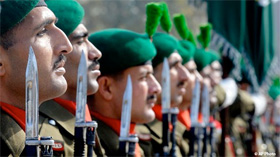The Anarchic Republic of Pakistan
 THERE IS perhaps no other political-military elite in the world whose aspirations for great-power regional status, whose desire to overextend and outmatch itself with meager resources, so outstrips reality as that of Pakistan. If it did not have such dire consequences for 170 million Pakistanis and nearly 2 billion people living in South Asia, this magical thinking would be amusing.
THERE IS perhaps no other political-military elite in the world whose aspirations for great-power regional status, whose desire to overextend and outmatch itself with meager resources, so outstrips reality as that of Pakistan. If it did not have such dire consequences for 170 million Pakistanis and nearly 2 billion people living in South Asia, this magical thinking would be amusing.
This is a country that sadly appears on every failing-state list and still wants to increase its arsenal from around 60 atomic weapons to well over 100 by buying two new nuclear reactors from China. This is a country isolated and friendless in its own region, facing unprecedented homegrown terrorism from extremists its army once trained, yet it pursues a “forward policy” in Afghanistan to ensure a pro-Pakistan government in Kabul as soon as the Americans leave.
For a state whose economy is on the skids and dependent on the IMF for massive bailouts, whose elite refuse to pay taxes, whose army drains an estimated 20 percent of the country’s annual budget, Pakistan continues to insist that peace with India is impossible for decades to come. For a country that was founded as a modern democracy for Muslims and non-Muslims alike and claims to be the bastion of moderate Islam, it has the worst discriminatory laws against minorities in the Muslim world and is being ripped apart through sectarian and extremist violence by radical groups who want to establish a new Islamic emirate in South Asia.
Pakistan’s military-intelligence establishment, or “deep state” as it is called, has lost over 2,300 soldiers battling these terrorists—the majority in the last 15 months after much U.S. cajoling to go after at least the Pakistani (if not the Afghan) Taliban. Despite these losses and considerable low morale in the armed forces, it still follows a pick-and-choose policy toward extremists, refusing to fight those who will confront India on its behalf as well as those Taliban who kill Western and Afghan soldiers in the war next-door. An army that has received nearly $12 billion in direct military aid from the United States since 2001, and has favored-nation status from NATO, still keeps the leaders of the Afghan Taliban in safe refuge. Pakistan’s civilians, politicians and intellectuals are helpless; they cannot make the deep state see sense as long as the West continues its duplicitous policies of propping up the military-intelligence establishment in opposition to popular society while demanding that the Pakistani civilian government wrest back control of the country.
Now there is a serious and deadly overlap—Pakistan’s extremists are determined to topple the political system and the deep state. The army is not oblivious to this reality, but it seems unwilling or unable to tackle the real issues at hand. “This is nothing but a creeping coup d’état by the forces of darkness, a coup that will spare no one,” wrote analyst Kamran Shafi in the Dawn newspaper this summer. “It is them against everyone else—an Islamic Emirate of Pakistan is the goal,” he added.
The deep state is failing its own people, who are in turn becoming more traumatized by the incessant violence, the lack of justice or security, and the perennial economic crisis. This only leads the civilian government to be even more inept, inconsequential and incapable of improving governance.
THE MOTHER of all insurgencies is taking place in the seven tribal agencies of Bajaur, Mohmand, Khyber, Orakzai, Kurram, and North and South Waziristan in the northwest-frontier region where the Pakistani Pashtun tribes—under the nomenclature of the Pakistani Taliban—are at war with the state. Amnesty International recently said that 4 million Pakistanis in this and adjoining regions are living under Taliban rule. Every time the army claims to have cleared one agency, the Taliban rebound in another with a vengeance.
Also operating from these northern bases are a dozen groups from Kashmir, Karachi and Punjab which were once trained by the military’s Inter-Services Intelligence (ISI) to fight in Indian Kashmir. They have now turned against their former handlers. The Pashtun Taliban have joined with their more sophisticated, better educated urban comrades to plan horrific acts of terrorism in Pakistani cities. Together they want to overthrow the state and establish an extremist Islamic system.
The Pakistani Taliban do not just kill police and soldiers in their barracks or even innocent civilians in mosques. On June 8 they launched a brazen attack on a convoy of trucks carrying NATO war materials for troops in Afghanistan in heavily populated northern Punjab—torching 50 vehicles. There is now talk of the Taliban shutting down Karachi port, where 80 percent of NATO supplies arrive. The public fear is that the army is losing control of the country as the extremists become ever stronger, ever more daring and ever more capable.
If local tribesmen even attempt collaboration with the state, deadly reprisals ensue. In the supposedly “Taliban-free” Mohmand Agency, people received U.S.-donated foodstuffs on July 8. The next day, while tribal elders gathered to discuss helping the army combat the Taliban, two suicide bombings killed over 100 people and wounded another 115.
Since 2004, the area has been hemorrhaging people. Out of a total population of 3.5 million, more than 1 million have fled the tribal agencies while another half a million left during the recent fighting only to become internally displaced refugees in nearby towns.

Keine Kommentare:
Kommentar veröffentlichen